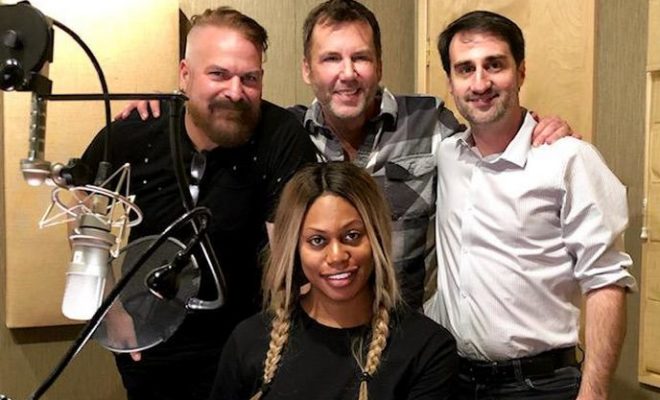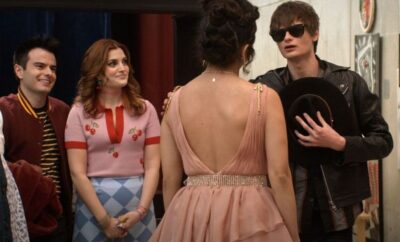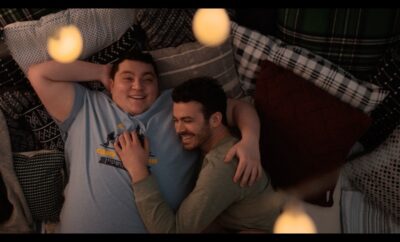 Director BILLY CLIFT, Producer DAVID MILLBERN, and President of HERE TV, JOHN MONGIARDO and LAVERNE COX
Director BILLY CLIFT, Producer DAVID MILLBERN, and President of HERE TV, JOHN MONGIARDO and LAVERNE COX
Interviews
David Millbern – A Long Road to Freedom: The Advocate Celebrates 50 years
By: Lisa Steinberg
Q) There is a quote that is in the film, “I remember the past, but I don’t live in it.” Right now, as many steps forward as we have taken, it does seem like with the current administration that the past isn’t that far behind us. What do you hope that this documentary instils in its viewers with regards to the charge and contentions that the LGBT community continues to face?
A) Despite the current situation in the White House, I remain optimistic. The recent Supreme Court decision that protects LGBTQ+ rights in the workplace is a sign that we should remain confident, but proactive. The documentary shows that when all marginalized communities unite around a common vision of freedom and social justice, we can and will prevail.
Q) We are always talking about passing the torch to the next generation. But another important quote in the movie says “Pass the torch, but never giveaway your light.” I think this quote personifies the documentary so well with the hallmarks of the LGBT community that are featured. How does the focus of these events show what has lit the way for the LGBT community while simultaneously reminding us of the fires we see still burning?
A) Robin Tyler’s quote refers to the fact that we stand on the shoulders of those who fought before us. Some have become our guardian angels and others are still valiantly on the frontlines. We all must inspire the next generation of warriors while remaining vigilant ourselves. The ‘long road to freedom” requires a multigenerational approach.
Q) This documentary is such an honest introspective on the love, loss, strength, and suffering within the LGBT community. What was the most important points that you wanted to convey when you initially began putting together the events and subjects that we see featured?
A) I wanted to show that all our stories connect in one long continuous tapestry. So many folks that have done so much deserve recognition. As a filmmaker, I needed to tell their stories. Not only did I want to honor their achievements, but also desired to inform and model responsibility and commitment for the social justice fight.
Q) We just finished Pride Month and having this documentary during a time when we can use the important reminder that Pride started as a riot feels incredibly relevant. Talk about how the Black Cat and Stonewall riots were the catalyst to the celebrations and social justice movements the community shares in today.
A) Both the Black Cat and Stonewall grew out of the civil rights and peace movements of the mid 1960’s. I’m so proud that this doc gives the Black Cat and Los Angeles it’s due since the protest pre-dates Stonewall by eighteen months. Now we have PRIDE Events in cities across the country and around the world. Progress! PRIDE not only celebrates LGBTQ+ achievements, but also serves as a rallying point for all intersectional communities…that’s a great legacy.
Q) June is pride month and in many ways it was celebrated and recognized differently this year. What are ways that we can all keep the spirit going and that you have been doing to make sure the spirit of Pride is still being acknowledged in all its forms while still respecting and supporting the movement?
A) When we show up to support BLACK LIVES MATTERS, WOMEN’S RIGHTS or any marginalized group we are showing up for ourselves. It’s not only the politically correct thing to do, it is the smart thing to do. United we have a stronger voice, same rights, same fight. Supporting other social justice warriors represents the very essence of PRIDE.
Q) What makes HereTV the perfect platform to share this stirring documentary?
A) The folks at HERETV have fought the social justice fight for over fifteen years. Currently, I produce the Here TV series “Girls’ Voices Now,” where we give cameras to underrepresented girls ages twelve to seventeen to tell their own unique stories. In addition, I also produce “HERE O’s,” honoring queer and straight ally heroes. HERETV has the LGBTQ+ mission in its DNA. I can’t say enough about their authenticity and inclusivity.
Q) What was the most challenging aspect of putting this film together?
A) Deciding what people to include. Everyone had such riveting stories of activism and sacrifice…. interspersed with just plain fun.
Q) Is there anything about the documentary you want to make sure to share or touch on?
A) Creating this documentary and capturing these stories humbled me. These heroes inspire me to do my part. We all personally benefit from their commitment and sacrifice. I hope in some small way this film encourages others to join the fight.





You must be logged in to post a comment Login